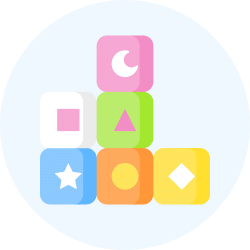LKG Exam > LKG Notes > English for LKG > Worksheet: Pronouns - 2
Worksheet: Pronouns - 2 | English for LKG PDF Download
Q1: Write each sentence using He, She, It, They.
(i)
_______ is a girl.
(ii)
______ is a vulture.
(iii)
________ is a farmer.
(iv)
______ is a teacher.
(v)
_______ are two lowers.
You can access the solutions to this worksheet here.
The document Worksheet: Pronouns - 2 | English for LKG is a part of the LKG Course English for LKG.
All you need of LKG at this link: LKG
|
67 videos|173 docs|1 tests
|
FAQs on Worksheet: Pronouns - 2 - English for LKG
| 1. What are pronouns? |  |
Ans. Pronouns are words used to replace nouns in a sentence. They help avoid repetition and make sentences less repetitive. For example, instead of saying "John went to the store. John bought some groceries," we can use pronouns and say "John went to the store. He bought some groceries."
| 2. What are the different types of pronouns? |  |
Ans. There are several types of pronouns, including personal pronouns, possessive pronouns, reflexive pronouns, demonstrative pronouns, interrogative pronouns, and indefinite pronouns. Personal pronouns refer to specific people or things, possessive pronouns show ownership, reflexive pronouns are used when the subject and object of a sentence are the same, demonstrative pronouns point to specific people or things, interrogative pronouns are used to ask questions, and indefinite pronouns refer to non-specific people or things.
| 3. How do we use pronouns in a sentence? |  |
Ans. Pronouns can be used in place of nouns to avoid repetition in a sentence. For example, instead of saying "Mary is a doctor. Mary helps people," we can use pronouns and say "Mary is a doctor. She helps people." When using pronouns, it is important to ensure that the pronoun matches the noun it is replacing in terms of gender, number, and person.
| 4. Can pronouns be singular and plural? |  |
Ans. Yes, pronouns can be singular or plural. Singular pronouns are used to refer to one person or thing, while plural pronouns are used to refer to more than one person or thing. For example, "he" is a singular pronoun, while "they" is a plural pronoun. It is important to use the correct pronoun to match the noun it is replacing.
| 5. What are some examples of pronouns? |  |
Ans. Some examples of pronouns include "I," "you," "he," "she," "it," "we," and "they" as personal pronouns. Examples of possessive pronouns include "mine," "yours," "his," "hers," "ours," and "theirs." Reflexive pronouns include "myself," "yourself," "himself," "herself," "itself," "ourselves," "yourselves," and "themselves." Demonstrative pronouns include "this," "that," "these," and "those." Interrogative pronouns include "who," "whom," "whose," "what," and "which." Indefinite pronouns include "someone," "anyone," "everyone," "something," "anything," "nothing," "all," "both," "few," "many," "several," and "some."
Related Searches






















